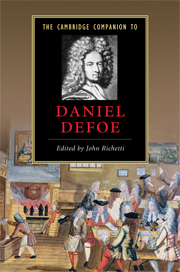Book contents
- Frontmatter
- Introduction
- 1 Defoe: the man in the works
- 2 Defoe’s political and religious journalism
- 3 Defoe, commerce, and empire
- 4 Defoe and criminal fiction
- 5 Money and character in Defoe’s fiction
- 6 Defoe’s Tour and the identity of Britain
- 7 Defoe as narrative innovator
- 8 Gender and fiction in Moll Flanders and Roxana
- 9 Defoe and London
- 10 Robinson Crusoe: varieties of fictional experience
- 11 Defoe: satirist and moralist
- 12 Defoe and poetic tradition
- Further Reading
- Index
5 - Money and character in Defoe’s fiction
Published online by Cambridge University Press: 28 March 2009
- Frontmatter
- Introduction
- 1 Defoe: the man in the works
- 2 Defoe’s political and religious journalism
- 3 Defoe, commerce, and empire
- 4 Defoe and criminal fiction
- 5 Money and character in Defoe’s fiction
- 6 Defoe’s Tour and the identity of Britain
- 7 Defoe as narrative innovator
- 8 Gender and fiction in Moll Flanders and Roxana
- 9 Defoe and London
- 10 Robinson Crusoe: varieties of fictional experience
- 11 Defoe: satirist and moralist
- 12 Defoe and poetic tradition
- Further Reading
- Index
Summary
As they tell their stories, the protagonists of Defoe's fictions may alert modern readers to the older meanings of the verb “to tell,” reminding us that, in the eighteenth century, stories and money alike were things that (along with ships' cargoes and tradespeople's stock) required telling. The Oxford English Dictionary in fact cites Defoe three times in its entry enumerating the twenty-six meanings of tell. Attending to these citations and the usage that the OED uses them to reconstruct can make visible the deep affinities, ones especially fruitful for Defoe's novels, that link the human activities of narrating and counting - just those affinities that still make “account” both another designation for a narration and a word for the computations, the reports on moneys paid and received, that comprise, for instance, a bank statement. To tell about tell, the OED draws first on Robinson Crusoe's reference to his Carib man Friday's inability to “tell twenty in English.” The OED moves next to the eponymous Colonel Jack's recollection of an episode from his youth, when he claimed a reward from a gentleman whose associate he and his mentor in the thieving trade had robbed earlier: the gentleman, Jack states, “told the money into my hand.” Then comes Jack's statement, from a subsequent moment in his criminal career, that when he disposed of the stolen goods abandoned by his foster brother (Captain Jack), he prudently took pains to know nothing about the bundle's content: “what his cargo amounted to, I knew not, for I never told it.” No reader of Crusoe or Colonel Jack or any other of the Defoe fictions in which ragged orphans, castaways, and abandoned women start from nothing, make their fortunes, and turn gentlemen and gentlewomen will be surprised to learn that lexicographers found his works a handy source of quotations to illuminate how telling can be a synonym for counting, counting out, and reckoning up.
- Type
- Chapter
- Information
- The Cambridge Companion to Daniel Defoe , pp. 84 - 101Publisher: Cambridge University PressPrint publication year: 2009
- 1
- Cited by

